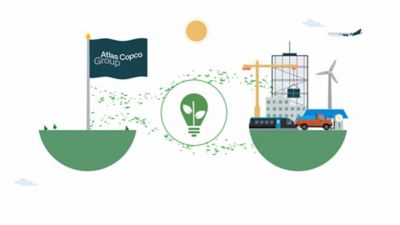ATLAS COPCO INTERIM REPORT (unaudited) Three months ended March 31, 1998
April 27, 1998
Positive profit trend
The Atlas Copco Group's revenues for the first three months of 1998 totaled SEK 8,108 m. (6,406), up 27 percent. Orders received increased 16 percent, to SEK 8,404 m. (7,215). For comparable units, revenues increased 11 percent, and orders received 2 percent. Exchange-rate changes added approximately 3 percent to both invoiced sales and orders received. The Atlas Copco Group's profit after financial items for the first three months of 1998 rose 20 percent, to SEK 881 m. (735). The profit margin was 10.9 percent (11.5). Market outlook Positive development of demand in Europe is expected to continue through 1998. Demand in the U.S. is expected to remain at a high level, while Asian markets, with the possible exception of China, will remain weak. Demand from the manufacturing industry is expected to be stronger than in the preceding year. The level of activity and, consequently, demand for consumables in the mining and construction industries are forecast to decline slightly, although investment activity should be stable. Structural changes Effective July 1, 1997, Atlas Copco acquired Prime Service, Inc., one of the largest equipment rental companies in the United States. At the acquisition date, Prime Service had 2,200 employees and operated 122 equipment rental locations in 14 states with a base of more than 40,000 customers. The company reported revenues of some SEK 2,500 m. in 1996 and operating earnings of SEK 510 m. Since the acquisition, Prime Service has acquired five equipment rental companies in the U.S., with annual revenues of approximately SEK 560 m. Prime Service constitutes a separate division within the Compressor Technique business area. Effective January 1998, Atlas Copco acquired the industrial compressor business of Ceccato, in Italy. The company, which manufactures and markets small and medium-sized industrial compressors, had annual sales of approximately SEK 200 m. in 1997 and employed 125 people. Ceccato is part of the Industrial Air division. In July 1997, the Wagner division acquired its distributor in South Africa, Hubert Davis Ltd. The operations, which have been integrated in the South African sales company, employ 80 people. Effective June 1, 1997, Atlas Copco acquired Thomé-Crépelle, a French manufacturer of large industrial piston compressors. The company has 200 employees and had sales of roughly SEK 250 m. in 1996. Thomé-Crépelle is now part of the Atlas Copco ACT division. Atlas Copco's tunnel-boring machine (TBM) operations, in the Construction and Mining Technique business area, is being phased out. Approximately 80 employees will be affected. Restructuring cost of SEK 50 m. was charged to 1997 earnings. Stronger demand in Europe Increased demand in Europe, particularly in Germany, France and Eastern Europe, resulted in higher order intake compared to the same period the preceding year. Orders received in North and South America were largely unchanged, excluding the effect of Prime Service. The financial crises in southeast Asia and South Korea negatively affected sales in these markets as well as in Japan and Australia. Orders received in China/Hong Kong remained stable. Earnings Operating profit amounted to SEK 1,043 m. (748), corresponding to 12.9 percent (11.7) of revenues. About one third of the improvement resulted from the Prime Service acquisition. The remaining improvement was predominantly coming from higher volumes and favorable exchange-rate developments. Net financial items amounted to SEK -162 m. (-13), of which net interest items accounted for SEK -160 m. (-21). Interest expense expanded because of higher net borrowing for the Prime Service acquisition. Interest income from currency hedging of foreign net assets was insignificant, at SEK 2 m., compared to SEK 30 m. in the same period the preceding year. Profit after financial items increased 20 percent, to SEK 881 m. (735), corresponding to a profit margin of 10.9 percent (11.5). Net profit for the period totaled SEK 561 m. (440), or SEK 3.06 per share (2.40), representing a gain of 28 percent. Based on net profit for the 12 months to March 31, earnings per share improved 27 percent, to SEK 12.69 (10.02). The return on capital employed during the 12 months to March 31 was 19.9 percent (20.1), and return on shareholders' equity 17.9 percent (15.9). Goodwill The acquisition of Prime Service, Inc., U.S., at July 1, 1997, resulted in goodwill of approximately SEK 6,800 m. Atlas Copco is amortizing this goodwill over a period of 40 years, the same as the goodwill for Milwaukee Electric Tool (SEK 3,100 m.). For purposes of comparison, the impact on earnings resulting from amortizing goodwill over periods of 20 and 40 years is shown below. The equity/assets ratio was 39.9 percent. If goodwill were amortized over 20 years, the equity/assets ratio would have been 39.3 percent. In 1995, the Swedish Financial Accounting Standards Council conducted a general review of its recommendation that prescribed amortization of goodwill over no more than 20 years. The Council subsequently published a new version of the recommendation, which went into effect on January 1, 1997. However, the Council elected to delay its recommendation on the maximum amortization period for goodwill pending the position adopted by the International Accounting Standards Committee (IASC). Atlas Copco intends to follow the final recommendation of the Council. Cash flow and net indebtedness The operating cash surplus, defined as revenues less non-financial operating expense after reversal of non-cash items, such as depreciation and amortization, amounted to SEK 1,560 m. (1,061), equaling 19 percent (17) of Group revenues. Working capital increased SEK 274 m. (First quarter 1997, decrease 183) during the period. Investments in tangible fixed assets totaled SEK 483 m. (289). The rise was mainly a result of greater investment in rental equipment. Cash flow from operations after financial items totaled SEK 309 m. (655). The net cash flow for the period amounted to SEK 162 m. (652*). The Group's net indebtedness, defined as the difference between interest-bearing liabilities and liquid assets, expanded as a consequence of the Prime Service acquisition, to SEK 10,093 m. (1,660), of which SEK 2,014 m. (1,987) was related to pension provisions. The debt/equity ratio, defined as net indebtedness divided by shareholders' equity, was 71 percent (13). Liquid assets ended the period at SEK 1,781 m. (3,037). Including minority interests, the Atlas Copco Group's shareholders' equity totaled SEK 14,176 m. (12,642), corresponding to SEK 77 per share (69). The equity/assets ratio was 40 percent (51). Investments Investments in property and machinery totaled SEK 160 m. (190). Investments in rental equipment reached SEK 323 m. (99). Total depreciation on these two asset groups during the period amounted to SEK 354 m. (225). Distribution of shares Share capital at the end of the period equaled SEK 918 m., distributed among the following classes of share. Personnel At the end of the period, the number of employees was 23,970 (20,909). The increase was wholly attributable to operations acquired during the 12 months to March 31. Business areas Compressor Technique The Compressor Technique business area consists of six divisions in the following product areas: Industrial compressors, Portable compressors, Gas and process compressors, and Equipment rental. Orders received during the period increased 31 percent, to SEK 4,315 m. (3,306). Acquired units, primarily Prime Service, accounted for the entire increase. Sales of industrial compressors increased in some European markets, while sales decreased in most Asian markets. Orders for portable compressors to the construction industry was low as demand from that sector remained weak. Orders for rental equipment in Prime Service during the period were negatively affected by bad weather, particularly on the west coast of the U.S. Revenues increased 50 percent, to SEK 4,209 m. (2,809) predominantly due to acquired units and a substantially higher invoicing of larger compressors to certain projects. Operating profit advanced 52 percent, to SEK 704 m. (462). The improvement was mainly due to the Prime acquisition and higher sales volumes, and partly a consequence of efficiency gains and favorable exchange rates. Construction and Mining Technique The Construction and Mining Technique business area consists of five divisions in the following product areas: Drilling rigs, Rock drilling tools, Construction tools, and Loading equipment. Orders received during the period equaled SEK 1,620 m. (1,736). The decline was evident in most major markets except Norway, France, Russia and South Africa, where order intake increased significantly. Demand for rock drilling equipment for underground work, primarily in the mining industry, was steady. The construction market deteriorated further mainly as a consequence of general economic conditions in the Asian region. Revenues totaled SEK 1,479 m. (1,458). Operating profit increased 16 percent, to SEK 104 m. (90). The increase resulted mainly from a better mix of product sales but also from internal efficiency gains. The improved currency situation, particularly the stronger U.S. dollar, had a slight positive effect. Industrial Technique The Industrial Technique business area consists of four divisions in the following product areas: Electric and pneumatic power tools, Assembly systems and Motion control products. Effective January 1, 1998, a new division, Alliance Tools, was created by the merger of the Chicago Pneumatic and Desoutter divisions. Orders received during the period increased 14 percent, to SEK 2,469 m. (2,173). Sales of pneumatic power tools increased in several European markets. Major orders were received from the automotive industry. The demand for electric power tools was positive in the American and European markets. A decline was noted in Asia, except for China. Revenues advanced 13 percent, to SEK 2,420 m. (2,139). Operating profit totaled SEK 260 m. (218). The improvement was mainly due to higher sales volumes. Market outlook Positive development of demand in Europe is expected to continue through 1998. Demand in the U.S. is expected to remain at a high level, while Asian markets, with the possible exception of China, will remain weak. Demand from the manufacturing industry is expected to be stronger than in the preceding year. The level of activity and, consequently, demand for consumables in the mining and construction industries are forecast to decline slightly, although investment activity should be stable. Stockholm, April 27, 1998 Giulio Mazzalupi President and Chief Executive Officer The interim report on the Atlas Copco Group´s operations during the first six months of 1998 will be published on August 4, 1998. For further information, please contact Annika Berglund, Vice President, Corporate Communications, phone +46 8 743 8070, mobile +46 70 322 8070 Hans Ola Meyer, Senior Vice President, Group Treasurer, phone +46 8 743 8292, mobile +46 70 588 8292




